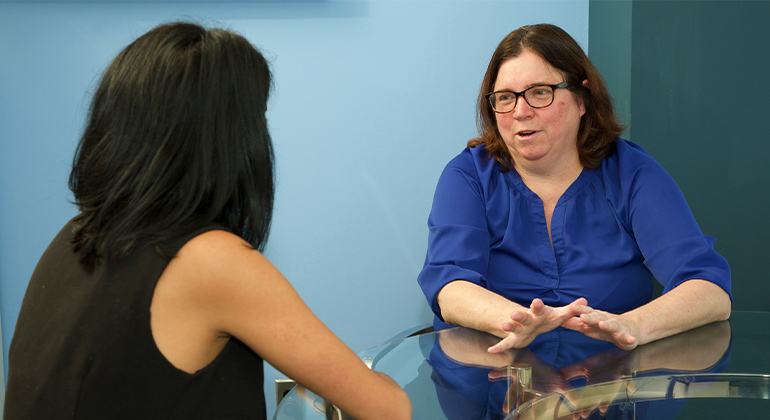Psychosis Risk Program

COVID-19 Clinical Services Update: The psychosis risk program is offering consultation and services in-person or via telehealth at this time. To make an appointment, please email shaynna.herrera@mssm.edu and rachel.jespersen@mssm.edu.
At Mount Sinai’s Psychosis Risk Program, we work with teenagers and young adults who are experiencing changes in their mood and behavior. At our clinic, you’ll receive state-of-the-art, expert evaluation and patient-centered, empirically-supported treatment.
You can expect specialized, compassionate care and treatment if you or someone you know is having any of these experiences:
- Confusion about what is real versus imaginary
- Feeling a loss of control over your own thoughts
- Feeling like your mind is playing tricks on you
- Feeling that other people are watching you or talking about you
- Feeling mistrustful or suspicious of others
- Hearing things, such as whispering or ringing, that others do not hear
- Seeing things, such as shadows or flashes out of the corner of the eye
- Difficulty organizing thoughts or speech or going off track when talking
- Difficulty functioning at school, work, or home
- Loss of interest in activities and socializing
Our Services
Patients in our program may receive individual, group, or family therapy, or some combination of modalities, based on their treatment goals and needs.
We offer the following services:
- Clinical and diagnostic evaluation
- Psychiatric consultation and medication management
- Psychoeducation (individual or family)
- Cognitive Behavioral Therapy for psychosis-risk (CBT-p)
- Opportunities to participate in research studies and contribute to a better understanding of these experiences and how best to treat them
Psychoeducation:
We offer a 5-session psychoeducational therapy program called BEGIN: Brief Educational Guide for Individuals in Need. BEGIN provides education about psychosis-risk and teaches young people how to self-assess and monitor their symptoms. BEGIN also assists young people in identifying personal and treatment goals, and helps them learn more about mental health treatment and make decisions about treatment. BEGIN utilizes a structured visual presentation to facilitate learning and enhance therapy.
Cognitive Behavioral Therapy:
Prevention of Symptoms and Psychosis through Education and Cognitive Therapy (ProSPECT) is a service for young people at risk between the ages 12-25 and their families. ProSPECT provides specialized evaluations, cognitive behavioral therapy (CBT), support with work and school goals through a mentorship program, and connection to auxiliary services as needed. ProSPECT is a stepped-care intervention, meaning participants can participate in a brief, introductory CBT intervention with their families to learn the basics before moving into a longer, group and family-based CBT intervention. The group and family-based cognitive behavioral therapy (GF-CBT) is an evidence-based treatment that aims to facilitate psychosocial recovery, decrease symptoms, and prevent psychosis in youth at risk. GF-CBT helps young people and their families to develop a better understanding of their psychotic-like experiences and sharpen their reasoning skills to prevent the formation of stressful paranoid thoughts
Research
If you are having psychotic-like experiences, you could be a good fit for our research studies. You will be compensated for your time and contribute to a better understanding of these experiences so that scientists can develop better treatments in the future. Please email Shaynna.herrera@mssm.edu if you are interested in participating in any of our research studies:
-
Language and Emotion Study: We are currently recruiting participants between the ages of 15 and 35 coping with psychotic-like experiences. We study language and emotion recognition using pen-and-paper tasks, computer games, audio-recorded interview, EEG, and MRI. If you are interested in participating, you can learn more here, or you can visit our website.
-
Brain Development Study: The purpose of this research study is to identify biological markers for schizophrenia and related mental illnesses. We are currently recruiting individuals between the ages of 18 and 40. This study involves a series of assessments; including medical and psychiatric history, magnetic resonance imaging (MRI) scan of the brain, blood collection, and a lumbar puncture performed to collect ‘cerebrospinal fluid’ (CSF). A lumbar puncture is also known colloquially as a "spinal tap". The blood and CSF will be tested for biological markers for schizophrenia and related mental illnesses.
-
ProNET Study: Psychosis Risk Outcomes Network, or ProNET, consortium will be based at 27 institutions across the globe, including a site at the Icahn School of Medicine at Mount Sinai, where investigators will characterize phenotypes associated with clinical high risk (CHR) or the prodrome state of schizophrenia in adolescents and young adults. This consortium will work to discover biological markers that can help identify those at risk of developing schizophrenia as early as possible, track the progression of symptoms and other outcomes and define targets for treatment development.
-
Vision and Cognition Study: The purpose of this research study is to learn more about how young people process visual images. You may be eligible for this study if you are between the ages of 16 and 35 and have some psychotic-like experiences. This study involves one in-person visit (about two hours) in which you complete a visual task on an iPad and a test that evaluates your cognitive abilities in different areas such as memory, attention and processing speed.